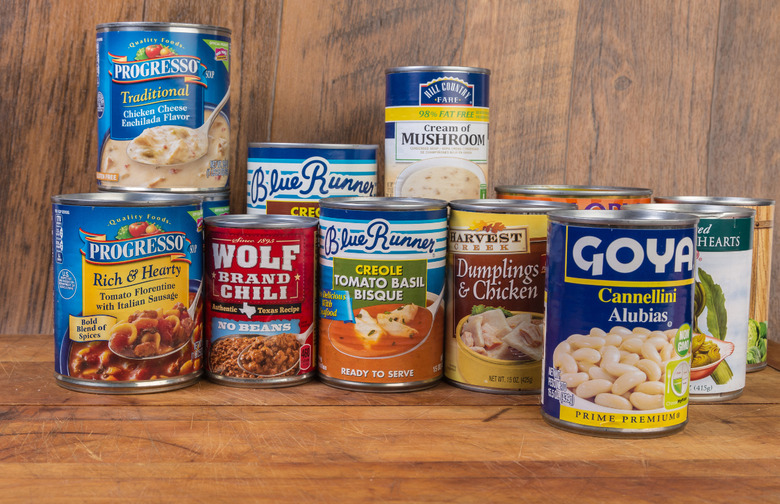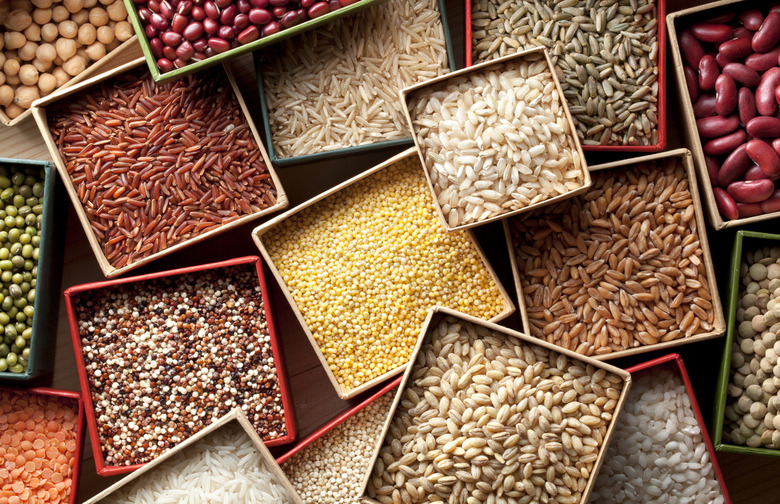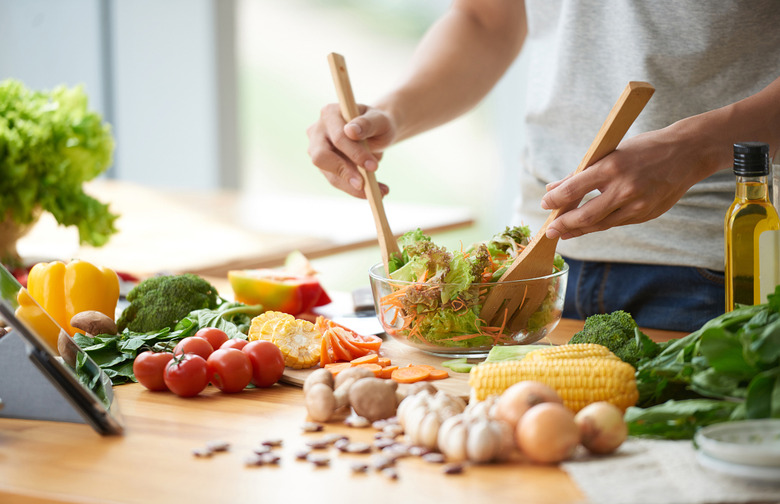How To Eat Healthy On The Cheap Slideshow
The standards for eating healthy keep getting higher and higher.
"The One Superfood You Need in Your Healthy Diet!"
"Buy This New Vegan Protein Bar to Lose Weight!"
"These Exotic Plants Go Perfectly With Salmon in This Crunchy Salad!"
Advertisements and "health tips" like these can make healthy eating seem further and further out of reach. When you're trying to make ends meet on a limited budget, you don't have the time or energy to try to make those complicated and expensive health habits work.
But the truth is, healthy eating is not that hard — and not that expensive. Sure, making your own nut milk and pounding the dough of homemade protein bars is labor-intensive and expensive. When it comes down to it, though, you don't need to do those things, or splurge on crazy health food items, to stay healthy.
In reality, it doesn't take much to stay healthy without breaking the bank. These 15 lifestyle swaps are so easy you won't even notice you're doing them, and they'll feel natural in no time. The only thing that will feel different — other than your health — is your loaded bank account.
Buy Coffee
People spend way too much on coffee. Seriously — millennials spend more on their caffeine fix than they do on retirement plans. Cut the spending habit and buy coffee to make at home. One cup of Starbucks coffee can add up to over five dollars, while a package of coffee grounds that makes over 20 cups could be around 10. Not only will you lower your spending, you'll also be more aware of the extra fats and sugar being poured in your cup if you're doing it yourself.
Buy Frozen
Frozen fruit, vegetables, meat, and beans are a life saver for your budget. They make adding fruits and veggies into your diet so much easier (and so much more delicious). Frozen fruits and veggies are fabulous fodder for smoothies, cooking recipes packed with greens, and adding sweet fruits to yogurt. Plus, the fact that they're frozen means they don't rot away in your fridge. Less food waste, more fiber. Win-win.
For a healthy guide to the frozen foods section, click here.
Buy in Bulk
Literally. Head to the bulk section of your grocery store and fill those bags with goods. Nuts, seeds, and dried fruit are all typically less expensive per pound from the plastic bins in the bulk food section than in pre-packaged form, and they all just so happen to make amazing additions to salads, yogurt bowls, and even a cooked dinner recipe or two.
Buy Snacks
The healthiest people are people who snack — and snack smart. Letting yourself go hungry until your next mealtime only sets you up for a metabolism crash and for overeating once you do sit down for your meal.
And let's be honest: The odds are high that you'll abandon all intention to wait until dinner and end up buying a snack anyway. So save yourself the health cost (and the monetary cost) and buy enough healthy snacks to last you the week. You'll be glad you have them later.
Choose When to Splurge
Be picky with your purchases. You're bound to be tempted at the grocery store by new products and flashy-looking health items. Pick one or two items each time to prevent major overspending.
Choose items that add health value, such as kombucha for your digestion, chia seeds for brain health, or fresh herbs for flavor and micronutrients. You'll start to learn to feel good about your purchases not only because of the taste but because of how great your body feels.
Cut Out the Drinks
It's enough already. Soda, fruit juice, and sports drinks add tons of sugar to your diet and tons of expenses to your receipt. Naturally flavored seltzer is a much cheaper (and healthier) alternative, so stick to that if you must. But the best case scenario is water — completely free and the healthiest drink you can find.
Eat More Canned Goods
Let's all just face it — anything that comes in a can is cheaper. The good news is the foods that come in a can also tend to be pretty healthy. Canned tomatoes? Great for you. Beans? Loaded with protein and fiber. Even vegetables come in a can — making cans a far less pricey way to add in your veggies than the fresh, quickly-rotting kind.
Some canned foods, such as syrupy fruit and oil-soaked tuna, aren't as great for your healthy lifestyle; just be judicious about your choices and read the ingredient labels.
Eat Three Meals a Day
Eating a full breakfast, lunch, and dinner keeps you satisfied, regulated, and less likely to make impulsive buys throughout the day. If you're someone who thinks they can survive on just a snack instead of lunch, you've probably ended up buying more food later before dinner all too often.
Use your groceries wisely and decide on three full meals to prevent these unplanned expenses.
Go With Grains
I'm sure you've heard the health advice to eat more whole grains. But that doesn't have to mean buying a ton of bread and "whole wheat" products. While those items are perfectly good to buy, too, sticking to buying grains in bulk instead is a much more budget-friendly way to hit these health goals.
Quinoa, rice, barley, and other whole grains are fantastic nutritionally and one of the least expensive items on your list. Just one three-dollar bag of rice could last you for weeks, and the grain could be used in a ton of recipes so you'll never get bored.
Use Plastic Containers
They're only a couple of dollars, and they'll save your life when it comes to keeping leftovers, bringing lunch to work, and storing the remainders from your cans and bags of food ingredients.
Keeping already-prepared food in your fridge is a healthy eating necessity. This way, you'll never find yourself in a bind and end up buying extra food.
Know When to Buy Organic
Foods labeled "organic" can be ridiculously overpriced when compared to non-organic alternatives. But is the organic status really worth the money? In some cases, it isn't. Some foods are virtually the same in terms of your health whether they're organic or not. Get educated about which foods are worth the splurge before venturing down the aisles.
Learn Some Basic Recipes
If you're too tired to cook anything elaborate one night, instead of reaching for the phone to order expensive takeout, whip up a simple (and cost-effective) meal instead. For example, learn how to grab a skillet and throw a few standard ingredients in. Give avocado toast a whirl, or try making a healthy grilled cheese.
Limit How Many Times You Go Out to Eat
Restaurant bills add up fast — and so do restaurant portions. Restaurants have gotten a lot of flack from nutrition experts for their loaded portion sizes and excess calories. Simply keeping tabs on the number of times you're going out to eat every week can help you eliminate those consequences to your health and your budget.
Make Your Own Dressings
You're a sucker if you're still going for the store-bought stuff. Not only are bottled dressings often filled to the brim with chemical additives and artificial flavorings, they're also pretty pricey.
Making your own dressing really only involves a couple of basic (and crazy-cheap) ingredients. Usually, the best dressings involve oil, vinegar, and some natural flavor boosters like lemon juice, spices, or mustard. Search a few basic recipes online and prepare whole batches of your favorites to keep in your fridge. Then, when you want a healthier, tastier dressing, you can just shake up your container and drizzle away, saving cash all the while.
Plan Ahead
When you grocery shop without a plan, you're setting yourself up for failure. Sit down and write down what you'll realistically be eating that week — meals, snacks, and all. Then devise your grocery list based on that. You'll be able to notice ways you can cut back and learn how to use ingredients you already have.
For some easy and delicious lunch inspiration, check out these 12 recipes.















